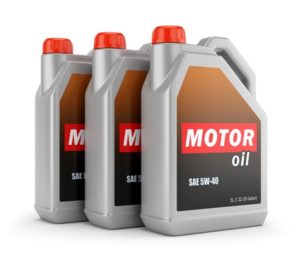Choosing the right oil for your car can seem daunting, considering the sheer number of different oils that are available to consumers. However, choosing the right oil for your car is actually a simple process. For starters, one’s desired motor-oil will be found in the vehicle’s owner’s manual. However, let’s take a deeper dive into the differences between motor oils to clarify why your vehicle needs the oil it does.
The Basics of Engine Oil
 It is important to note that oils are differentiated according to their viscosity, and that viscosity matters according to both the needs of the particular vehicle and the heat that its oil will be exposed to. An engine that will be exposed to colder temperatures will generally need a lower viscosity so that it can better separate in your car’s engine, whereas a higher viscosity is desirable in higher temperatures so as to not separate too much. Other factors, like the mileage on the engine, will also affect the desirable viscosity.
It is important to note that oils are differentiated according to their viscosity, and that viscosity matters according to both the needs of the particular vehicle and the heat that its oil will be exposed to. An engine that will be exposed to colder temperatures will generally need a lower viscosity so that it can better separate in your car’s engine, whereas a higher viscosity is desirable in higher temperatures so as to not separate too much. Other factors, like the mileage on the engine, will also affect the desirable viscosity.
With that in mind, the overall viscosity of the modern day motor-oil is not limited. Oils will often contain a blend of different oil so that it can best respond to a variety of conditions.
Now, the meaning of the numbers attached to the oil becomes clear: the higher the number, the higher the viscosity. And there will likely be a range of viscosities to reflect that aforementioned difference of conditions. Also, note that the “W” which precedes that range simply means “winter”, or the viscosity of the oil in colder temperatures.
The Different Types of Oil
 There are also several different types of engine oils: conventional, synthetic, or a blend of the two. Synthetic oils are different from more traditional oil in that they are more refined and specifically engineered for high performance. Therefore, synthetic oils are used for vehicles that require high performance. This means vehicles that tow, or vehicles that are subjected to extreme temperatures. These don’t encompass the average driver; however, a blend of synthetic and traditional oil might might be appropriate if you are looking for better performance at a more affordable rate.
There are also several different types of engine oils: conventional, synthetic, or a blend of the two. Synthetic oils are different from more traditional oil in that they are more refined and specifically engineered for high performance. Therefore, synthetic oils are used for vehicles that require high performance. This means vehicles that tow, or vehicles that are subjected to extreme temperatures. These don’t encompass the average driver; however, a blend of synthetic and traditional oil might might be appropriate if you are looking for better performance at a more affordable rate.
More refined, synthetic oil benefits the engine in a variety of ways. Primarily, that extra refinement means that the oil is more uniform in its composition. Therefore, it is less likely to cause friction, create deposits, or contain impurities, all of which negatively affect performance and fuel economy.
Additives
Another factor when considering your vehicle’s oil is from which additives your car would benefit. There seems to be an endless number of additives, some of which justify premium pricing. Some of the most important to look for are antioxidants and detergents which maintain the purity and consistency of your oil. These increase the lifespan of your oil so that you are less likely to require constant oil-changes.
When to Change the Oil For Your Car
 Of course, all vehicles require regular oil-changes to maintain the health of the engine. Over time, the oil will break down, lose its viscosity, and fail to properly lubricate the engine. All sorts of problems ensue, including reduced fuel economy, degradation of the engine, and if not promptly addressed, engine failure.
Of course, all vehicles require regular oil-changes to maintain the health of the engine. Over time, the oil will break down, lose its viscosity, and fail to properly lubricate the engine. All sorts of problems ensue, including reduced fuel economy, degradation of the engine, and if not promptly addressed, engine failure.
One can easily check to see if an oil change is necessary with your “dipstick” (always make sure to wipe the dipstick clean before checking oil quality). On inspection, the oil for your car should be amber in color. If it’s dark, smoky, and tar-like, it’s too dirty and broken down to function properly and requires changing. Of course, its overall level will be indicated by the dipstick as well, which will be a good indicator of whether the oil needs to be replaced.
As a rule of thumb, newer engines require oil changes every six months, and older engines should have their oil changed more frequently (every three thousand miles or every three months). However, the dipstick will always provide the best indication of where your oil is at in its lifespan and if a change is needed.
Fast and Convenient Oil For Your Car At T3 Atlanta
When your vehicle does require an oil change, residents of the Atlanta metro area have T3 Atlanta to resolve all their automotive concerns and needs. Both of their locations in Smyrna and Decatur will be able to ensure that your engine is properly lubricated and running at its best.










Leave a Reply
You must be logged in to post a comment.